
University of Virginia Spends $20 Million On 235 DEI Staffers
March 25, 2024
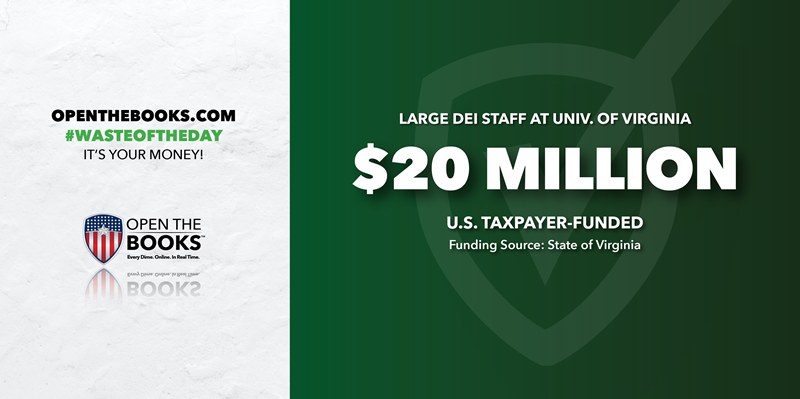
Topline: The University of Virginia spent an estimated $20 million to pay its 235 “diversity, equity and inclusion” employees last year, according to payroll recordsobtained by OpenTheBooks.com.
Key facts: These employees under the DEI banner earned $15 million in salary and an estimated $5 million in benefits, OpenTheBooks found.
That’s the full tuition payments for nearly 1,000 in-state undergraduate students. The university only has 17,500 undergraduates.
The highest-paid DEI employees included Martin N. Davidson, who earned $587,340 in pay and estimated benefits as the school’s “global chief diversity officer.”
Vice President for DEI Kevin G. McDonald, who is in-charge of university-wide DEI programming, earned $521,905 in pay and estimated benefits. His base salary of $401,000 was more than the President of the United States was paid last year.
UVA has several separate DEI departments with overlapping goals, each with their own staff and payroll costs. The school has an Office of Diversity, Equity and Inclusion, Equity Center, an Office of Diversity and Engagement and more.
There are also DEI-related positions sprinkled throughout the university’s departments, including the urology department, engineering school, medical school and more.
The university paid six-figure salaries to 47 different DEI employees, not including benefits. Six of the employees had a higher base pay than Virginia Gov. Glenn Youngkin’s $175,000 salary.
The DEI payroll includes 82 student employees who are part-time employees or interns.
Background: DEI programs have garnered national attention in recent months. Florida and Texas recently banned DEI positions at taxpayer-funded state schools. Bills currently in the Idaho and Wyoming state legislatures are modeled loosely on Florida’s law.
Critics says that DEI judges’ people on the color of their skin, their gender identity, and their pronouns. Merit ceases as a primary measure of success. A regime of “equal outcomes” replaces Jeffersonian principles that “All men are created equal” – in other words “equal opportunity,” but no guarantee of success.
DEI cuts at the foundational principles of the American founding.
Supporting quote: A UVA spokesperson told the Washington Examiner that the university only has 55 “dedicated DEI positions,” although he wouldn’t provide OpenTheBooks with his list. Our subsequent Freedom of Information Act request for the underlying database of the 55 university admitted DEI staffers was rejected with the university saying, “No records exist.”
“We welcome students, faculty and staff who reflect the rich diversity of the Commonwealth we serve, we focus intently on teaching students to bridge differences in ideology, life experience, and other perspectives, and we strive to offer a wide range of points of view in the classroom and in programming around grounds,” the spokesperson said.
Summary: Gov. Glenn Youngkin will appoint five new members to the UVA governing body in July. Then, he will have a de facto major to push reform at UVA. So, stay tuned. It will be interesting to see if anything changes at the university.
The “Podcast Tax” Cost $324 Million Since 2020
March 26, 2024
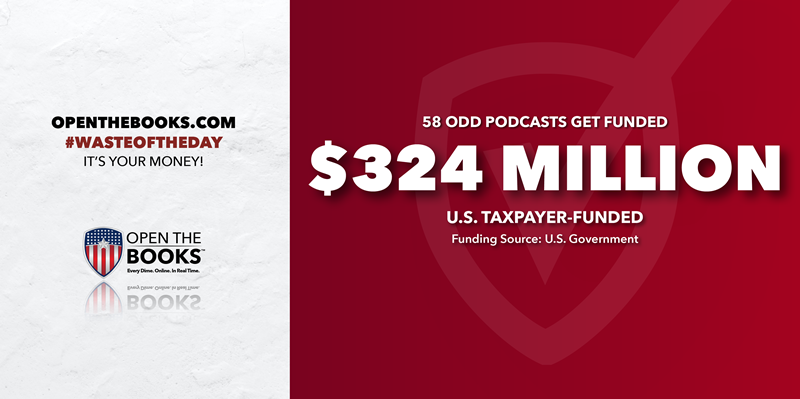
Topline: The federal government has given $324 million since 2020 to projects that have created a podcast, including some with questionable topics, according to a recent investigation from OpenTheBooks.com.
Key facts: OpenTheBooks’ auditors identified a list of 58 podcasts created with government funds, covering everything from Swedish gender-neutral pronouns to AI-generated erotic literature.
The Regeneration Rising podcast, which received over $446,000 from the Department of Agriculture, has an episode about “building a queer farmer community.”
Another show with almost $200,000 in grant money speaks about the “important role” of Satanists in American religion.
Other podcasts are simply silly. One show with over $556,000 in funding made an episode about “superheroes prepared to help us defeat the coronavirus: Sgt. Socially Distanced, the Masked Mentor, the Testmaster and the Vaxinator!”
The most expensive program used almost $1.2 million to produce a podcast on the history of the Rocky Mountain region. Other government-funded topics included “19th-century male romantic friendships” and transgender people in Zimbabwe.
Background: Not all of the funding was solely for podcasting, but $324 million still went to initiatives that made podcasts as part of their project.
That figure seems even larger when compared to the overall budgets of the National Endowment for the Humanities and the National Endowment for the Arts, which contributed a significant portion of the funds.
The two agencies had a combined budget of $1.4 billion since 2020, only about four times more than what was spent on projects involving podcasts in the same time frame.
Supporting quote: “As with all NEA grants, these grants are made on the basis of artistic excellence and artistic merit as described on the NEA website and as required by Congress,” a spokeswoman for the agency told the New York Post.
“Panels of arts experts and other individuals from communities across the country, including at least one knowledgeable layperson, made recommendations on all of the Grants for Arts Projects applications. Panel recommendations were reviewed by the National Council on the Arts and then the NEA chair, who makes the final decision on all grant awards.”
Summary: The NEH website says the agency only funds “excellence,” but it’s up for debate whether the 58 podcasts that received federal funding all meet that criteria.
Houston DPW Chief Buys Gold Coins Bearing Her Name
March 27, 2024
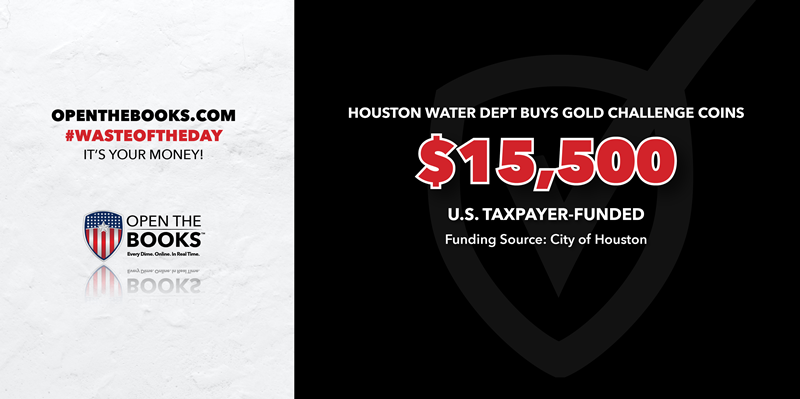
Topline: Families in Houston are still being overcharged for their water bills, but Public Works Director Carol Haddock seems to have another, slightly more narcissistic priority.
She spent $15,500 to distribute 5,000 commemorative “challenge coins" to employees, each inscribed with Haddock’s own name in gold lettering.
Key facts: Haddock announced the coins in a video emailed to Public Works staff that KPRC 2 Houston obtained from an anonymous tip. The TV station filed a public information request to get the price tag.
Haddock earnestly declares in the video that the coins have “that iconic Houston skyline, which is a powerful tie to who it is that we’re serving on a daily basis.”
The coins were sent to every member of the city council, though one councilwoman said, “I see no use for it.”
Haddock also recently spent $13,000 to buy 180 Samsonite backpacks for her employees.
Meanwhile, thousands of Houston families are being billed monthly by Public Works for water meters they aren’t even using. The only way to avoid it is to pay a private plumber to remove the meter. The city passed nine ordinances in December to try and resolve the issue, but the bills persist.
Background: It’s no wonder that Haddock has such expensive taste. She’s one of the highest-paid people in all of Houston, according to records at OpenTheBooks.com.
Haddock took home $292,000 in 2022, more than all but 16 other City of Houston employees. That’s also more than former Mayor Sylvester Turner and Texas Gov. Greg Abbott made that year.
Supporting quote: Houston Public Works told KPRC 2 that “In the tradition of our military, challenge coins are given as a source of morale, pride and to recognize hard work. The HPW Challenge Coin was created during the mayoral transition period to be a physical reminder of our foundational work amid growing uncertainty.”
Critical quote: The TV station wrote, “Investigative Reporter Amy Davis requested interviews with Haddock a few times this year. Her staff told us she would talk to us once she and the mayor released the new water plan to help customers stuck with outrageous bills. We assumed that is taking up a lot of her time. But then we saw a video made for her employees.”
Summary: Challenge coins are traditionally given for a special achievement or award, usually by the military. How kind of Haddock to declare herself worthy of that honor.
Throwback Thursday: Researchers Blow Grant Funds on Failed Worm Expedition
March 28, 2024
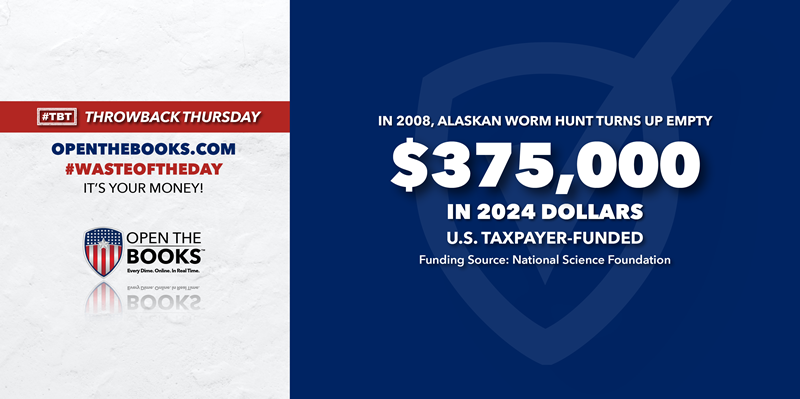
Throwback Thursday!
Topline: Ice worms are so tiny that a dozen of them could fit on one fingertip. That makes them incredibly difficult to find in the wild — even with the help of $325,000 in taxpayer funds.
That didn’t stop Rutgers University professor Daniel Shain from trying, and failing, to find ice worms in Alaska in 2008, wasting his grant from the National Science Foundation in the process. Shain’s award was worth almost $475,000 in today’s money.
That’s according to the “Wastebook” reporting published by the late U.S. Senator Dr. Tom Coburn. For years, these reports shined a white-hot spotlight on federal frauds and taxpayer abuses.
Coburn, the legendary U.S. Senator from Oklahoma, earned the nickname "Dr. No" by stopping thousands of pork-barrel projects using the Senate rules. Projects that he couldn't stop, Coburn included in his oversight reports.
Coburn's Wastebook 2008 included 65 examples of outrageous spending worth more than $1.3 billion, including the $325,000 ice worm grant.
Key facts: Shain and his team of researchers flew, skied and walked over glaciers in Denali National Park, yet were unable to find ice worms.
They had planned to collect several hundred to compare to worms living in the Southern Hemisphere.
Shain had already received a $214,000 grant From NASA for a similar purpose in 2005.
Ice worms can only survive in temperatures ranging from 32 to 40 degrees Fahrenheit, according to the University of Alaska Fairbanks. They eat algae and bacteria living on glaciers.
They’ve taken on their own significance among local Alaskans. Some once believed the ice worms were mythical, and they’re honored every year at the eight-day Cordova Ice Worm Festival.
Supporting quote: “Finding them would be great, and would likely mean a new species to science,” Shain told the University of Alaska before leaving on his trip. “The alternative (not finding them) is less appealing, but that is the risk.”
Summary: How about this for a rule for taxpayer funds? If a worm can barely be seen with the naked eye, it’s not worth $325,000 to find.
New York Will Multiply Campaign Donations Up To 12 Times
March 29, 2024
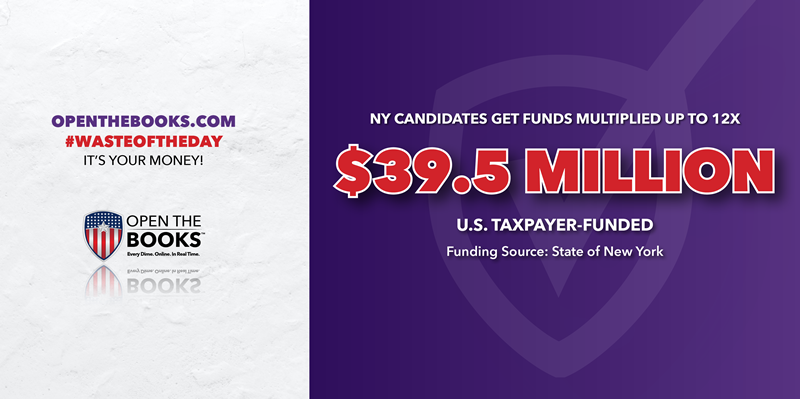
Topline: A relatively new program in New York State will use $39.5 million of taxpayer funds to match small donations to political campaigns for state offices, expanding them up to 12 times their original value.
Key facts: The Public Campaign Finance Program multiplies campaign contributions of $250 or less. If an individual donates $10 to a legislative candidate, the politician will receive an extra $120 from the government.
Candidates running for governor, lieutenant governor, attorney general or comptroller receive funds at a 6 to 1 ratio.
Politicians running for the state legislature get their donations multiplied between eight and 12 times, depending on the size of the gift.
Only $25 million will be sent to candidates. The remaining $14.5 million is for administrative purposes.
That’s still far less than the $100 million the Public Campaign Finance Board said it needed.
A report from OpenSecrets and the Brennan Center predicts that small donors will now account for 41% of state campaign funds, instead of 6%.
Supporters tout the program as an important step in campaign finance reform because it gives more power to low-income citizens.
Critics argue that similar programs have not significantly changed voter turnout or re-election rates but are vulnerable to fraud.
Background: Thirteen other states already have programs similar to New York’s, as well as some cities like Denver and Washington D.C. Seattle gives voters two free $25 vouchers that they can send to candidates. New York City’s matching fundsgives taxpayer-money to candidates running for city office like mayo, city council and comptroller.
New York Gov. Kathy Hochul vetoed a change that would have matched donations as large as $12,000.
The only similar federal program to New York’s is one for presidential candidatesthat hasn’t been used in the general election since John McCain in 2008.
Supporting quote: "Because the program's match is limited to small contributions from constituents, it will push back on the toxic influence of big money in our politics and uplift the voices of everyday voters," Joanna Zdanys of the Brennan Center for Justice said in a statement. "It will give candidates a powerful incentive to engage with their own constituents. And it will open pathways for New Yorkers who aren't wealthy to participate [in] the political process."
Critical quote: Election attorney Joseph Burns told Fox News that the law will aid progressive candidates more than other politicians, and that in similar programs, the money “ends up just becoming an unnecessary and wasteful taxpayer subsidy of politicians and political campaigns.”
Summary: It remains to be seen whether New York’s new law will help candidates opposed to the political establishment or if it is just another failed program that soaks taxpayers for an ever-expanding bureaucracy.
The #WasteOfTheDay is presented by the forensic auditors at OpenTheBooks.com.